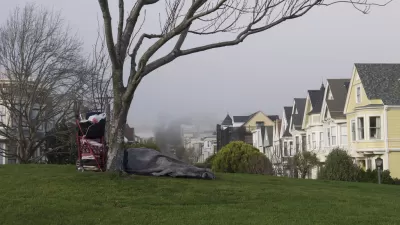Unable to pass the measure themselves, four San Francisco Board of Supervisors approved a ballot measure for November that would let voters decide on the removal of tent encampments in the city providing that housing is offered.

Tuesday was the deadline for the Board of Supervisors to approve measures for the November ballot that they are unable to pass themselves. In addition to the tent measure, two other housing initiatives were approved.
"Voters in a city long weary of seeing sidewalks filled with homeless camps will soon get the chance to prove just how willing they are to see them forcibly cleared," writes Emily Green who covers San Francisco City Hall for the San Francisco Chronicle.
An initiative by San Francisco Supervisor Mark Farrell to allow authorities to remove an encampment, as long as its residents are given 24-hour written notice and the offer of a shelter bed or other form of housing, is among a number of initiatives headed for the November ballot.
The signatures of four supervisors are required to place an initiative on the ballot, and Farrell was joined by Scott Wiener, Katy Tang and Malia Cohen.
Supervisor John Avalos criticized the measure.
“There are not enough shelter beds for all the people living in encampments,” Avalos said... Avalos and the Coalition on Homelessness want the city to provide bathroom and garbage services to homeless camps.
Farrell countered: “This is about the right policy for the city of San Francisco, and the reality is we are designating significant amounts of additional revenue in the budget for shelter and housing.” He said allowing people to stay in tent camps is “inherently unhealthy, incredibly dangerous.”
San Francisco is hardly alone in dealing with growing numbers of homeless. In March, Planetizen editor James Brasuell wrote about recent efforts by Los Angeles, Dallas, as well as San Francisco (including helpful links to understand the local issues) to 'crack down' on homeless encampments.
Two other housing measures the supervisors approved placing on the November ballot dealt with increasing heights for affordable housing and legalizing construction on inlaw units.
The former measure, by Supervisor Katy Tang, would "allow 100 percent affordable housing projects to have three extra stories," writes Green. "The progressive supervisors, led by Aaron Peskin, have introduced a counterproposal, but with more restrictions. The two sides are at an impasse."
The measure originated in a proposal to increasing building heights as part of a density bonus policy "to reach [Mayor Ed] Lee’s goal of 30,000 new or rehabbed housing units by 2020" that has met opposition," baffling city planners, wrote J.K. Dineen for The Chronicle last February.
Opposition to Tang's building height measure is described in greater detail in an separate article by Green on June 21 about Mayor Ed Lee's housing plan being placed 'on hold' by the supervisors.
FULL STORY: Tent city law headed to ballot in SF

Planetizen Federal Action Tracker
A weekly monitor of how Trump’s orders and actions are impacting planners and planning in America.

Restaurant Patios Were a Pandemic Win — Why Were They so Hard to Keep?
Social distancing requirements and changes in travel patterns prompted cities to pilot new uses for street and sidewalk space. Then it got complicated.

Map: Where Senate Republicans Want to Sell Your Public Lands
For public land advocates, the Senate Republicans’ proposal to sell millions of acres of public land in the West is “the biggest fight of their careers.”

Maui's Vacation Rental Debate Turns Ugly
Verbal attacks, misinformation campaigns and fistfights plague a high-stakes debate to convert thousands of vacation rentals into long-term housing.

San Francisco Suspends Traffic Calming Amidst Record Deaths
Citing “a challenging fiscal landscape,” the city will cease the program on the heels of 42 traffic deaths, including 24 pedestrians.

California Homeless Arrests, Citations Spike After Ruling
An investigation reveals that anti-homeless actions increased up to 500% after Grants Pass v. Johnson — even in cities claiming no policy change.
Urban Design for Planners 1: Software Tools
This six-course series explores essential urban design concepts using open source software and equips planners with the tools they need to participate fully in the urban design process.
Planning for Universal Design
Learn the tools for implementing Universal Design in planning regulations.
Heyer Gruel & Associates PA
JM Goldson LLC
Custer County Colorado
City of Camden Redevelopment Agency
City of Astoria
Transportation Research & Education Center (TREC) at Portland State University
Camden Redevelopment Agency
City of Claremont
Municipality of Princeton (NJ)





























